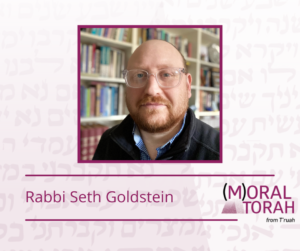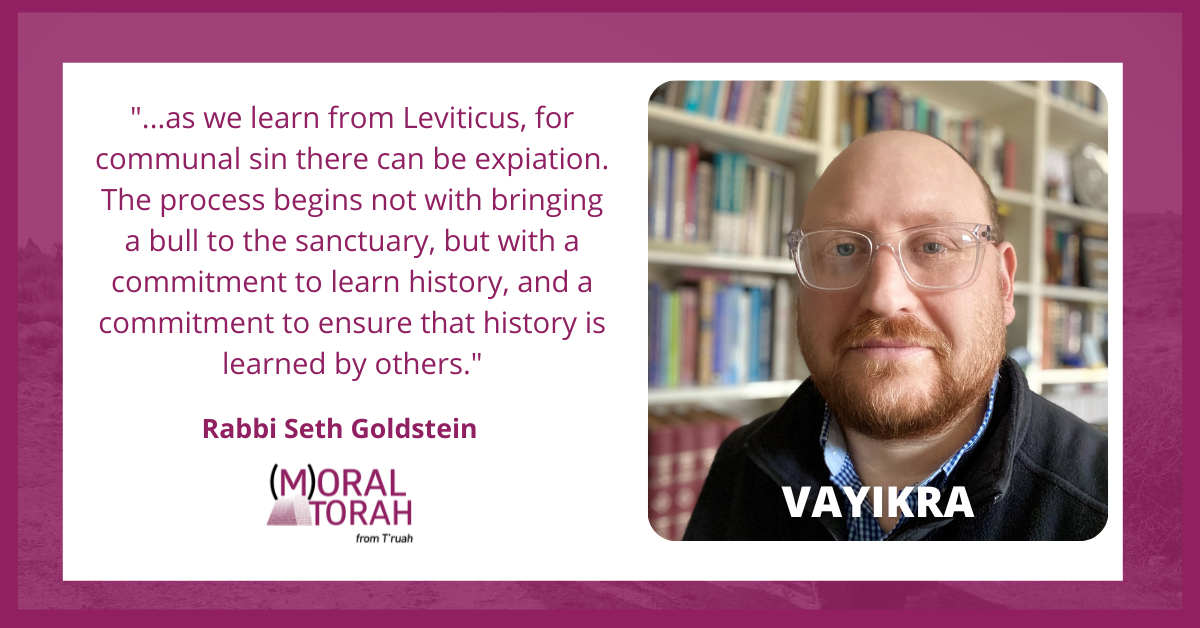A D’var Torah for Parshat Vayikra by Rabbi Seth Goldstein
Is it possible for an entire community — an entire nation — to sin?
In this week’s Torah portion of Vayikra, we begin the book of Leviticus, which in its opening chapters describes the procedures for making sacrifices and offerings in the ancient Tabernacle. These can be understood as the ancient means of prayer, the means of communicating with the divine. For various reasons, both positive and negative, one may bring an offering of animals, birds, or grain to a priest, who will bring it to the altar.
One such reason for an offering is atonement for sin, and the Torah describes a number of instances in which such an offering is required. And while most offerings are done on behalf of individuals, there are times when an entire community is guilty:
Sign up to receive (M)oral Torah in your inbox each week.
If the entire community errs and the matter escapes the notice of the congregation, so that they do any of the things which by God’s commandments ought not to be done, and they realize guilt— when the sin through which they incurred guilt becomes known, the congregation shall offer a bull of the herd as a sin offering, and bring it before the Tabernacle. The elders of the community shall lay their hands upon the head of the bull before God, and the bull shall be slaughtered before God. (Leviticus 4:13-15)
For us, living in a country that prefers to point blame at the other side, or misguided leaders, or individual actors, the Torah brings a powerful corrective. No, the text says, everyone is to blame for society’s ills. And while it is hard to imagine how an entire populace can engage in sinful acts, it is perhaps the “sins of omission” of which we are more often guilty. Turning away, neglecting our history, willfully not knowing what is happening — these can be considered sinful as well.
Recently, the United States passed a painful anniversary. On February 17, 1942 — 80 years ago last month — President Franklin Delano Roosevelt signed Executive Order 9066, which led to the forcible removal and internment of close to 120,000 people of Japanese ancestry in 10 different camps scattered around the inland western United States.
A few years ago, my family and I visited Minidoka, one of the camps located in Idaho, in a rural area about two hours east of Boise near the borders of Nevada and Utah. Many residents from the Pacific Northwest, where I now live, were removed to Minidoka. It is now a national park and museum, and there we learned about the history of the internment, the difficult conditions of life at the camp, and the specific legacies of racism and xenophobia that led to the Executive Order and still persist today. And I am embarrassed to say I was learning most of this for the first time.
Find more commentaries on Parshat Vayikra.
While exploring this site as a Jewish family, it was hard not to think about the connection to the Jewish experience and the attitude of fear and exclusion directed at Jews at the same period in history. The same government that ordered the internment of Japanese residents also turned away boats of Jewish refugees fleeing Europe. Indeed, the same act of legislation in 1924 that severely limited Jewish immigration also completely eliminated immigration from Asia.
It is the history of Jewish refugees that must inspire us as Jews to be aware of and advocate for issues affecting refugees to our country and around the world today. This past Shabbat was the HIAS-sponsored Refugee Shabbat, in which the Jewish community dedicated our sacred day of rest to learning about these issues.  And part of that learning must be about our country’s sins when it comes to engaging with refugees and immigrants, sins that include closed doors and compulsory relocation. It is my fervent belief that everyone should visit a Japanese internment camp.
And part of that learning must be about our country’s sins when it comes to engaging with refugees and immigrants, sins that include closed doors and compulsory relocation. It is my fervent belief that everyone should visit a Japanese internment camp.
And as we learn from Leviticus, for communal sin there can be expiation. The process begins not with bringing a bull to the sanctuary, but with a commitment to learn history, and a commitment to ensure that history is learned by others. It is in this way we can begin our atonement and can proclaim nidoto nai yoni — “let it never happen again.”
Rabbi Seth Goldstein is a 2003 graduate of the Reconstructionist Rabbinical College and rabbi of Temple Beth Hatfiloh in Olympia, WA. He also makes TikToks (@rabbi_360).

